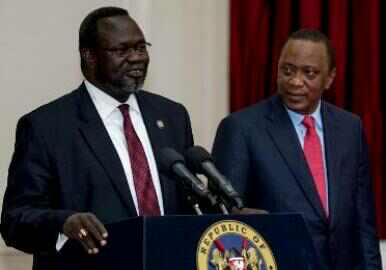Machar calls on Kiir to engage in direct negotiations in Addis Ababa
February 26, 2015 (ADDIS ABABA) – South Sudanese former vice-president and rebel leader, Riek Machar, has called on his counterpart, president Salva Kiir, to “pack his suitcase” and come to Addis Ababa for direct negotiations with him in order to quickly resolve major sticking points and end the 14-month long civil war in the country.

On 1 February before going for a three-week break, the two principals agreed to resume direct negotiations on 20 February so as to resolve the outstanding issues and sign a final peace agreement by 5 March dateline imposed by the IGAD mediation.
In a press statement he issued on Thursday, 26 February, Machar who leads the rebel faction of the Sudan Peoples’ Liberation Movement (SPLM-IO) slammed president Kiir for lack of commitment to end the war, saying he had been waiting in Addis Ababa hoping to resume and finalize the negotiations and beat the dateline.
“The final phase of the IGAD led peace process started on February 20th 2015 and I have been waiting here in Addis Ababa, Ethiopia. It is now one week and president Salva Kiir has not shown up for the peace talks,” lamented the rebel leader.
He said he was committed to peaceful resolution to the conflict which has raged on for 14 months, hailing the efforts exerted by the IGAD mediation to end the bloodshed.
The former vice-president said the war has resulted into untold suffering of the people and that there was need to resolve the issues by the two top leaders before 5 March.
“This is not the time to procrastinate but to expedite the peace agreement such that our people rebuild their lives in peace and harmony.”
“It is time to restore law and order in South Sudan,” he said.
He called on president Kiir to heed the cries of the people of South Sudan, adding together the two principals would “quickly workout the terms of the peace agreement.”
IGAD mediators have given 5 March as the dateline to reach a final peace deal, saying this round was the last chance for the warring parties.
Ambassador Seyoum Mesfin, IGAD chief mediator and chairman of the special envoys for South Sudan in a statement during the opening of the talks decried the absence of president Kiir from the venue and called on Juba’s top executive to travel to Addis Ababa for direct negotiations with the rebel leader.
Issues yet to be resolved within the one-week remaining timeframe include governance, political and institutional reforms, security arrangements, economic reforms, leadership structure and power-sharing ratios, accountability and reconciliation and public service reforms.
However, talks have been polluted by reports of resumed violence in Upper Nile and Unity states in violation of the cessation of hostilities agreement signed since 23 January 2014 by the two warring parties.
This is amidst fresh accusations by Khartoum against Kampala, saying 16,000 Ugandan troops allied to president Kiir’s government were being deployed at the Sudanese border in Unity and Upper Nile states to help fight against Machar’s rebels. Khartoum warned this could result to intensified war around the border areas.
South Sudanese rebels have been calling on Kampala to withdraw its troops from South Sudan in accordance with the cessation of hostilities agreement, accusing the foreign troops of interference in the internal conflict.
President Museveni has so far not heeded to the call, arguing that Juba would collapse should his forces withdraw from the country unless an alternative regional force was deployed.
(ST)
Related article:
